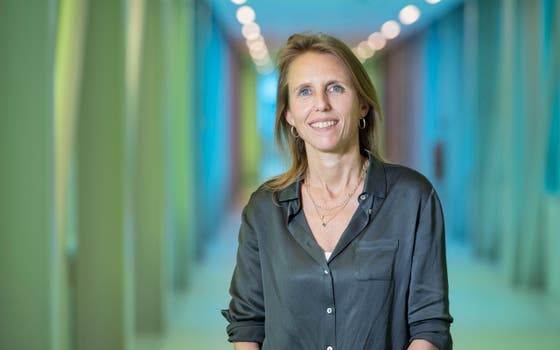Sabine Fuchs appointed professor

How do we improve care for patients with rare diseases for which there are currently no treatments? This question is central to the work of pediatrician Sabine Fuchs. She has been appointed professor of Metabolic diseases and innovative therapies at the UMC Utrecht as of April 15, 2024. ‘I want to make these types of diseases treatable by also focusing on the other organs.’
Metabolic diseases: various conditions with a common core
Metabolic diseases affect more than 10,000 families in the Netherlands. They are often difficult to treat and are a major cause of infant mortality. In her research and within her professorship, Sabine wants to find out what the underlying mechanisms of metabolic diseases are in this large group of different conditions. One of the overarching factors is the cause of these diseases: they are all caused by errors in the DNA.
'By developing techniques to repair a number of specific errors in different organs, I want to lay the foundation for treating all these types of diseases,' says Sabine Fuchs, who works as a pediatrician and research group leader at the UMC Utrecht/WKZ and is active within the strategic research programs Child Health and Regenerative Medicine & Stem Cells. 'It remains important that we use the various techniques in a responsible and certainly safe manner.'
Cell and gene therapy are promising...
‘As a pediatrician in metabolic diseases, I focus on improving care by developing new therapies that involve genetic techniques,’ Sabine continues. 'With cell and gene therapy there is finally a real chance curing metabolic diseases. The cause of the disease is literally tackled at its core. The error in the DNA is, as it were, repaired. Until now, most of our treatment options were intensive, symptomatic treatments.'
...but they must end up in the right organ
Using the latest techniques, gene correction tools are being developed to treat metabolic diseases. This technological progress makes it possible to repair the genetic cause of virtually all metabolic diseases, but so far mostly in cells in a laboratory setting. That's because these cells are easy to reach. The next challenge is to get these tools to the right location in the body.
From the liver to other organs
Sabine was already working on transport systems to the liver. She will also focus on the bone marrow, the eye and the brain. 'The liver is an important metabolic organ that is also relatively easily accessible for this type of therapy. We have made the furthest progress with this in the laboratory. How can we accelerate the translation of innovations from research to the clinic? For the future, I also want to focus on the bone marrow if possible. Bone marrow transplants, like liver transplants, are an important treatment for metabolic diseases. The advantage is that treatment can take place outside the body, as an intermediate step to direct treatment in the body.’
The eye is also interesting, as blindness is very disabling and you can inject directly into the eye, allowing the therapy to reach high local concentrations. And finally the brain: 'Brain damage often leads to severe symptoms in patients with metabolic diseases. That is where I would really like to focus on, but this is the most difficult organ to reach.'
Collaboration for the best solution for as many patients as possible
Sabine: ‘As a pediatrician, I know that this group of patients with a metabolic disease often gets the short end of the stick because they are a small group and therefore less attractive for drug development.’ Yet Sabine sees all kinds of opportunities: ‘Many patients within UMC Utrecht suffer from a rare hereditary disease. Genetic therapies are therefore very interesting for many groups and organs. Team Science and Open Science, or collaboration and openness, can speed up development in research, education and healthcare. I hope that this chair will lead to more collaborations and acceleration in this area.'
